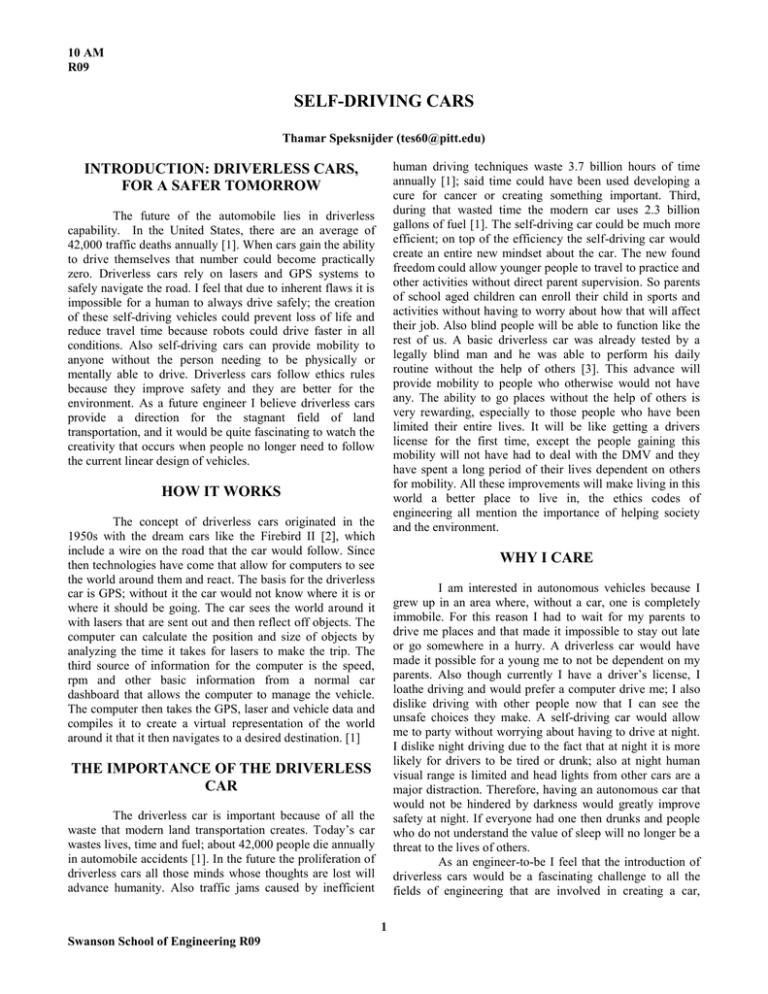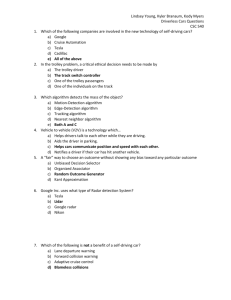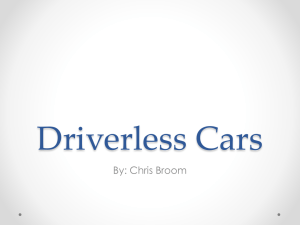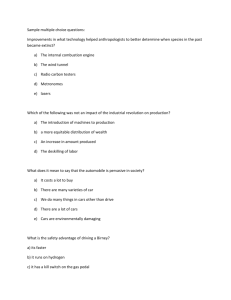Paper Three
advertisement

10 AM R09 SELF-DRIVING CARS Thamar Speksnijder (tes60@pitt.edu) human driving techniques waste 3.7 billion hours of time annually [1]; said time could have been used developing a cure for cancer or creating something important. Third, during that wasted time the modern car uses 2.3 billion gallons of fuel [1]. The self-driving car could be much more efficient; on top of the efficiency the self-driving car would create an entire new mindset about the car. The new found freedom could allow younger people to travel to practice and other activities without direct parent supervision. So parents of school aged children can enroll their child in sports and activities without having to worry about how that will affect their job. Also blind people will be able to function like the rest of us. A basic driverless car was already tested by a legally blind man and he was able to perform his daily routine without the help of others [3]. This advance will provide mobility to people who otherwise would not have any. The ability to go places without the help of others is very rewarding, especially to those people who have been limited their entire lives. It will be like getting a drivers license for the first time, except the people gaining this mobility will not have had to deal with the DMV and they have spent a long period of their lives dependent on others for mobility. All these improvements will make living in this world a better place to live in, the ethics codes of engineering all mention the importance of helping society and the environment. INTRODUCTION: DRIVERLESS CARS, FOR A SAFER TOMORROW The future of the automobile lies in driverless capability. In the United States, there are an average of 42,000 traffic deaths annually [1]. When cars gain the ability to drive themselves that number could become practically zero. Driverless cars rely on lasers and GPS systems to safely navigate the road. I feel that due to inherent flaws it is impossible for a human to always drive safely; the creation of these self-driving vehicles could prevent loss of life and reduce travel time because robots could drive faster in all conditions. Also self-driving cars can provide mobility to anyone without the person needing to be physically or mentally able to drive. Driverless cars follow ethics rules because they improve safety and they are better for the environment. As a future engineer I believe driverless cars provide a direction for the stagnant field of land transportation, and it would be quite fascinating to watch the creativity that occurs when people no longer need to follow the current linear design of vehicles. HOW IT WORKS The concept of driverless cars originated in the 1950s with the dream cars like the Firebird II [2], which include a wire on the road that the car would follow. Since then technologies have come that allow for computers to see the world around them and react. The basis for the driverless car is GPS; without it the car would not know where it is or where it should be going. The car sees the world around it with lasers that are sent out and then reflect off objects. The computer can calculate the position and size of objects by analyzing the time it takes for lasers to make the trip. The third source of information for the computer is the speed, rpm and other basic information from a normal car dashboard that allows the computer to manage the vehicle. The computer then takes the GPS, laser and vehicle data and compiles it to create a virtual representation of the world around it that it then navigates to a desired destination. [1] WHY I CARE I am interested in autonomous vehicles because I grew up in an area where, without a car, one is completely immobile. For this reason I had to wait for my parents to drive me places and that made it impossible to stay out late or go somewhere in a hurry. A driverless car would have made it possible for a young me to not be dependent on my parents. Also though currently I have a driver’s license, I loathe driving and would prefer a computer drive me; I also dislike driving with other people now that I can see the unsafe choices they make. A self-driving car would allow me to party without worrying about having to drive at night. I dislike night driving due to the fact that at night it is more likely for drivers to be tired or drunk; also at night human visual range is limited and head lights from other cars are a major distraction. Therefore, having an autonomous car that would not be hindered by darkness would greatly improve safety at night. If everyone had one then drunks and people who do not understand the value of sleep will no longer be a threat to the lives of others. As an engineer-to-be I feel that the introduction of driverless cars would be a fascinating challenge to all the fields of engineering that are involved in creating a car, THE IMPORTANCE OF THE DRIVERLESS CAR The driverless car is important because of all the waste that modern land transportation creates. Today’s car wastes lives, time and fuel; about 42,000 people die annually in automobile accidents [1]. In the future the proliferation of driverless cars all those minds whose thoughts are lost will advance humanity. Also traffic jams caused by inefficient 1 Swanson School of Engineering R09 Thamar Speksnijder especially mechanical engineers because they have to incorporate the instruments required for autonomous driving with the rest of the vehicle without creating excess weight or ruining the aerodynamics of the car. Also the driverless car will inspire technology advances in all the necessary components of the car. For example the use of lasers to guide the vehicle will drive down the price and size of lasers, allowing other devices to utilize the technology. Also I can envision how the basic design of the car can change without the need for a drive and cars could be made to carry more people or made to make longer drives more comfortable. People have already created advances like cars that guide themselves through traffic and cars that park themselves [4]. I feel that the code of ethics for engineers supports me fully in my belief of a future with driverless cars. The first canon of the codes says that one must believe that heath, welfare, and safety are our number one priority. By not pursuing driverless cars we are disobeying the code of ethics because we have the potential to drastically increase the safety of public roads. Then the canons also state the importance of the environment. Since driverless cars use less fuel and less space than their conventional counterparts they clearly support the code of ethics. The future will bring many more developments. accidents. It improves health by reducing stress caused by hours spent in traffic. Also it improves public welfare by reducing the pollution and noise from highways; making the world a more pleasant place to live. The self-driving car also is reinforced by the canon “Engineers shall consider environmental impact and sustainable development in the performance of their professional duties.”[8] The selfdriving car will help the environment by reducing the consumption of fossil fuels. The driverless car uses less fuel because it will travel at a constant speed and it will maximize the fuel efficiency in all its driving. A computer can be set to obey restraints that no human could follow perfectly. A fuel efficient driver accelerates and brakes in moderation, travels at a constant speed and follows the most economical route. A normal person is to impatient to always have a light foot on the throttle while a compute can be made to do so. Also people tend to be impatient ant try to find short-cuts or they try to find roads with exciting curves; A computer on the other hand has no such interests, all a computer in a car will want to do is safely and efficiently transport their passengers to their desired destination. Therefore a computer guided vehicle will be superior to a human in every way. The driverless car is an ethical advancement for society as it corrects the flaws of modern transportation. THE FUTURE OF THE AUTONOMOUS VEHICLE EDUCATION I believe that a project like this one has benefits in an engineering program. The research into a field of engineering and a current issue in that field forces a student to see what interests them and truly see what excites them in engineering. Before this paper I had little to no idea what I like about engineering, I had chosen engineering because I like using what I learn in school to make something work. It is important to be able to use what you learn in real life [9]. While I was browsing topics I found my niche. I believe that every student should find their subject before they have to choose a major. I also like this assignment because it forces engineers to write. Writing is a skill that many do not possess. The best way for someone to learn writing is to have them write about something they like. In high school teachers make students write about literature. I personally did not enjoy that at all. This paper is the first time I ever went out of my comfort zone and tried to improve my writing ability and truly embrace the challenge. I feel that all engineers should be placed in a position where they can improve their writing skills. This assignment has its downsides because after writing about something they love a student must write about ethics. I personally do not enjoy learning about or using codes of conduct written by other people. I have a strict moral code that I follow on a day to day basis. I do not need a code of ethics to keep me in line because the bar I set for myself is much higher and much stronger than anything anyone else has. I feel that a student must find their own In the future the driverless car will change the very landscape of the automotive industry. The auto insurance industry will have to deal with the change. Insurance companies have already calculated that with the decrease in accidents the premiums will go down and their industry will lose revenue [5]. People are predicting a decline in other driver related industries as well, taxis will no longer be necessary, when things like automated car sharing becomes prevalent [6] and truckers will lose their jobs since a robots can drive longer and safer than humans. Though some people lose the majority of people would win because they no longer have to wait in traffic or in line at the DMV. Imagine a world where instead of parking one just gets out and the car will keep itself busy while you shop [6], and instead of vast parking lots there are other buildings or parks. ETHICS In Engineering, like all fields there are certain codes of ethics that must be followed to promote fair play and progression in the field. Self-driving cars are an excellent example of an idea that will improve society and follow ethical codes. The Self-driving car is reinforced by the canon to “Hold paramount the safety, health, and welfare of the public” [7]. It improves the safety by reducing 2 Thamar Speksnijder morals and follow them, if an employer does not like their beliefs they should remove them. The writing about ethics is a major hit to a student’s motivation. I generally consider myself a motivated man but the prospect of writing about ethics shut down all the excitement I gained from the first half of this assignment. I do feel that this section about education is an excellent part of the assignment, it is a formal method of discovering what students are taking from this assignment. A student who generally speaks poorly of the assignment or has an obvious lack of excitement is probably not enthusiastic about the assignment and could be having trouble finding their niche in engineering. This is a good way for a third party to indirectly see how a student is doing. http://go.galegroup.com/ps/i.do?id=GALE%7CA300363048 &v=2.1&u=upitt_main&it=r&p=ITOF&sw=w. [6] "Google's Revolutionary Self-Driving Car." PC Magazine Online. (Online Article). http://go.galegroup.com/ps/i.do?id=GALE%7CA289186433 &v=2.1&u=upitt_main&it=r&p=ITOF&sw=w. [7] National Society of Professional Engineers. (2007) “Code of Ethics for Engineers.” (Code of Ethics). [8] American Society of Mechanical Engineers. “Society Policy.” (Code of Ethics) [9] Bernard M. Gordon and Michael B. Silevitch. “Reengineering Engineering Education.” The New England Journal Of Higher Education. (Print Article). pp. 18-19 ADDITIONAL SOURCES CONCLUSION: WHY YOU SHOULD CARE “A look inside Google's ‘Driverless http://www.youtube.com/watch?v=J17Qgc4a8xY. The future of land transportation resides within the driverless car; the impact on society will be great but the benefits of cars that drive themselves will make the change worth it. The fact that computers can drive faster and better without the risk will reduce the amount of time people spend stuck in traffic, which will save time and money due to increased productivity. One of the most important aspects of a world where cars drive themselves will be the independence of the otherwise limited individuals in society. For example, the blind, the young, and the disabled will be provided the same transportation that any able bodied adult gets. This breaking of the chains will allow these otherwise immobile people to function on their own and not burden others with their need for transport. Once people get over their inhibitions of cars without drivers, there will be a new freedom in the world. The autonomous car will help people that would otherwise not be able to travel alone realize the freedom and beauty of independent mobility. (2301) Car’” ACKNOWLEDGMENTS I would like to thank Keely Bowers, writing instructor who graded my other paper, the feedback was helpful for attempting to improve my writing for this paper. Also I would like to thank Dr. Budney for his in class formatting advice. Finally I would thank Jared Helms for his help with grammar. REFERENCES [1] S. Thrun. (2010). “Toward Robotic Cars.” Communications of the ACM. (Print Article). Vol. 53 Issue 4, p99-106. [2] "Self-driving cars set for future highways." Business Daily Update. (Online Article). http://go.galegroup.com/ps/i.do?id=GALE%7CA300054513 &v=2.1&u=upitt_main&it=r&p=ITOF&sw=w. [3] "Smarter car." Optician. (Online Article). http://go.galegroup.com/ps/i.do?id=GALE%7CA285945470 &v=2.1&u=upitt_main&it=r&p=ITOF&sw=w. [4] "Safer at any speed? Self-driving cars." The Economist. (Online Article). http://go.galegroup.com/ps/i.do?id=GALE%7CA281700634 &v=2.1&u=upitt_main&it=r&p=ITOF&sw=w. [5] "Insurance industry sees future with self-driving cars." New Orleans CityBusiness. (Online Article). 3





